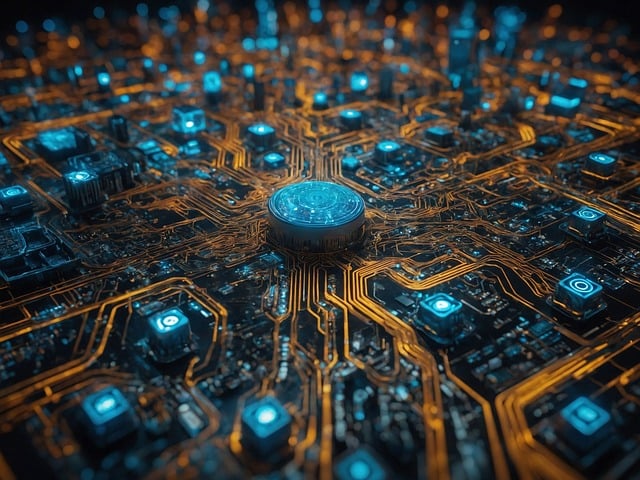Artificial Intelligence (AI) is transforming kitchen design in ghost kitchens by leveraging advanced algorithms for optimal layout planning and task streamlining. Key features include AI route delay forecasting, intelligent mapping, and analysis of workflow patterns, appliance needs, and space constraints. This results in improved productivity, efficient resource utilization, and faster service times for enhanced customer satisfaction. AI route delay forecasting predicts delivery times accurately, enabling managers to optimize routes, allocate resources efficiently, and schedule deliveries during less congested periods, leading to significant cost savings and a competitive advantage.
In the era of rapid food delivery, ghost kitchens—hub-and-spoke models optimizing cooking and packing—are transforming culinary landscapes. Artificial Intelligence (AI) plays a pivotal role in this revolution, offering sophisticated solutions for efficient kitchen layout design. This article delves into how AI enhances ghost kitchen operations through intelligent route planning and delay forecasting, fostering streamlined workflows and improved customer satisfaction. We explore practical implementation strategies, highlighting the potential of AI to redefine modern culinary experiences.
- Understanding AI's Role in Optimizing Kitchen Layouts
- Route Delay Forecasting: Enhancing Efficiency in Ghost Kitchens
- Implementing AI for Intelligent Kitchen Design Practices
Understanding AI's Role in Optimizing Kitchen Layouts

Artificial Intelligence (AI) is transforming kitchen design, particularly in the emerging concept of ghost kitchens or cloud kitchens. By leveraging advanced algorithms, AI plays a pivotal role in optimizing kitchen layouts to enhance efficiency and productivity. One key aspect is predicting AI route delay forecasting, which involves intelligent mapping of workspace and equipment placement. This ensures that tasks are streamlined, minimizing movement and reducing time wasted.
AI-driven design tools analyze various factors like workflow patterns, appliance requirements, and space constraints to create dynamic and adaptable kitchen layouts. These systems can adapt to changing operational needs, accommodating new menu items or peak hours without compromising functionality. As a result, AI ghost kitchen layout designs offer improved productivity, better resource utilization, and ultimately, enhanced customer satisfaction through faster service times.
Route Delay Forecasting: Enhancing Efficiency in Ghost Kitchens

AI-powered route delay forecasting is transforming ghost kitchen operations, optimizing delivery routes and minimizing delays. By analyzing historical data, real-time traffic patterns, and dynamic factors like weather conditions and events, AI algorithms predict delivery times with unprecedented accuracy. This predictive capability allows ghost kitchen managers to allocate resources more efficiently, schedule deliveries during less congested periods, and improve overall service speed.
Such enhancements translate into cost savings, increased customer satisfaction, and a competitive edge in the dynamic food delivery market. As AI route delay forecasting continues to evolve, ghost kitchens can look forward to even smarter, more optimized layouts that prioritize swift and reliable order fulfillment.
Implementing AI for Intelligent Kitchen Design Practices

The integration of Artificial Intelligence (AI) into kitchen design is transforming the way we conceptualize and organize culinary spaces. One innovative application is AI route delay forecasting, which leverages machine learning algorithms to predict cooking times and optimize kitchen layout. By analyzing historical data on dish preparation, ingredient dependencies, and equipment usage, AI systems can identify bottlenecks and suggest efficient workflows. This proactive approach ensures that food preparation flows smoothly, minimizing delays and maximizing productivity in what’s often referred to as a ghost kitchen or cloud kitchen setting.
Moreover, intelligent kitchen design powered by AI considers the unique demands of various cuisines and dining formats. Whether it’s optimizing the placement of cooking stations for minimal ingredient transport distances or incorporating smart sensors to monitor inventory levels in real-time, AI-driven practices enhance operational efficiency. As a result, ghost kitchens can offer improved service times, cost savings, and enhanced customer experiences, solidifying their position as game-changers in the food delivery and catering industry.
AI is transforming the landscape of kitchen design, especially in ghost kitchens, by optimizing layouts and enhancing efficiency. Through advanced algorithms, AI can predict route delays, ensuring food delivery at lightning speeds. Implementing these intelligent design practices not only improves operational effectiveness but also revolutionizes the dining experience for customers. With AI route delay forecasting as a cornerstone, ghost kitchens can navigate their labyrinthine operations with precision, ultimately fostering a thriving and seamless culinary ecosystem.
